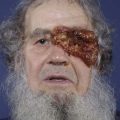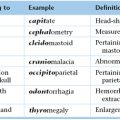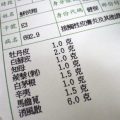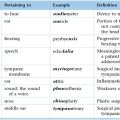Chapter 3
Putting the History Together
The doctor may also learn more about the illness from the way the patient tells the story than from the story itself.
James B. Herrick (1861–1954)
In the first two chapters, the interviewer’s questions and the patient’s responses were discussed. In this chapter, these materials are put together to create a mock interview. In the following interview, note the way in which the interviewer allows the patient to speak and the way various techniques are incorporated. The footnotes refer to the type of technique used and other important aspects of the interview.
In writing up the history, be precise and well organized. The patient relates the history in his or her order; you need to reorganize the facts into the standard form discussed in Chapter 1 (i.e., chief complaint, history of present illness, etc.). Your skill in writing up the history will evolve with time as you gather more experience. Make sure that you organize the history in chronological order. Always record all the relevant data obtained. If data aren’t recorded, that data will be lost permanently. Be careful about using abbreviations; they may mean something different to others. As an example, PND often stands for paroxysmal nocturnal dyspnea; however, it is often used to mean postnasal drip (or discharge). Finally, be objective; the patient record is no place for editorial or judgmental comments. Your opinion should not be in evidence; just state the facts. For example, state, “alcohol on breath,” not “patient drunk.”
Interview of Mr. John Doe
Mr. John Doe, the patient, is lying comfortably in a two-bed room in St. Catherine’s Hospital. He is a white man, slightly obese, and in his mid-40s. Mr. Doe is watching television. The interviewer, wearing a white coat, enters the room.
(Interviewer smiles and extends hand for a firm handshake.)
Interviewer: Good morning, I’m Susan Smith, a second-year medical student. Are you Mr. John Doe?
(Pause; interviewer watches for response.)
(Extends hand to shake hand of Mr. Doe.)
Interviewer: Nice to meet you, Mr. Doe. I’ve been asked to interview and examine you today.
(Patient smiles, appearing friendly.)
Patient: Dr. James, my resident, told me you’d be coming to see me.
Interviewer: Would you mind if we turn off the TV?
(Patient turns off television.)
Interviewer: How are you today?
Patient: OK. No pain for the past 2 days.
Interviewer: Tell me about the problem that brought you to the hospital, Mr. Doe?1
Patient: I’ve been having terrible chest pain for the past 6 months. . . .
Patient: Yeah. I had my first heart attack.3
Interviewer: How did you feel when you left the hospital?
Patient: I really felt fine. No more chest pain. My doctor there had given me some pills and said I would be fine.4
Interviewer: Then what happened?5
Patient: I went back to work after about 3 weeks. I really felt great!
Interviewer: What type of work do you do?
Interviewer: You mentioned that this was your first heart attack. Have you had others?
Interviewer: Tell me about it.6
Patient: Six months later, I had my second attack.
Interviewer: What were you doing?
Interviewer: Did you have any tests while you were in the hospital?
The doctor just gave me some pills to strengthen my heart and for the irregularity.
Interviewer: Your silence makes me think that you want to tell me something.8
Patient: I should have listened to him.
I’ve really not been able to do anything for the past 6 months.
I had to give up my work at the office. Sure, they still call me for advice, but it’s not the same.
The commuting by car just got to me.
My son and his friends yelling around the house.
Interviewer: What did your doctor tell you about the test?9
Interviewer: After the study, your doctor will be in the best position to answer that question.10
Tell me about the pain you’ve been having.
Interviewer: What’s the pain like now?
Patient: It’s an awful tightness, like a vise. . . .
Interviewer: When you get the pain, do you feel it anywhere else?
Patient: Yeah. It goes straight to my back and my left arm. The arm feels so heavy.
Interviewer: Are there any other times when you get the pain?
Patient: It seems I get it with the slightest effort or emotion.
Interviewer: Do you get the pain during sexual intercourse?
Interviewer: Have you had any difficulty breathing?
Patient: When I get the pain, I get short of breath.
Interviewer: Do you ever get short of breath without the pain?
Patient: I find I just can’t walk far any more without getting winded.
Interviewer: How many level blocks can you walk now without getting short of breath?
Interviewer: How much could you walk 6 months ago?
Patient: I guess about two to three blocks.
Interviewer: Since your heart attack, have you had any skipped beats or fluttering of your heart?
Interviewer: Has anyone ever told you that your cholesterol or fats in your blood were high?12
Interviewer: Have you ever smoked?
Patient: I stopped after my first heart attack.
Interviewer: That’s great that you stopped smoking. How much did you smoke?
Patient: About two packs a day.
Patient: Oh . . . since I was about 18.
Interviewer: May I ask your age?13
Interviewer: Have you ever had high blood pressure?
Interviewer: Do you know how high your pressure was?14
Interviewer: Do you have diabetes?
Interviewer:(interrupting) I’m glad his hip is well healed. Is there anyone else in your family who has diabetes?15
Interviewer: Anyone else in your family who’s had a heart attack?
Patient: I think my mother’s father died of a heart attack.
Interviewer: What about your mother?16
Interviewer: Do you have any brothers or sisters?
Patient: My sister is 37 and she’s fine.
Interviewer: Any other siblings?
Patient: My brother is 45. He had a heart attack when he was 40.17
Interviewer: Do you have any children?
Interviewer: How’s your son’s health?
Patient: No problem, except he’s a little overweight.
Interviewer: Are you married?18
Patient: To a great gal. Emily’s the one who convinced me to have the test.19
Interviewer: Does anyone in your family have high blood pressure?
Interviewer: Birth defects or congenital diseases?
Interviewer: Have you ever been hospitalized here at St. Catherine’s Hospital?
Interviewer: Have you ever been hospitalized at any time other than for your heart attacks?
Patient: I had my appendix taken out when I was 15.
Interviewer: Do you remember the surgeon’s name and the hospital?
Patient: I think it was a Dr. Meyers at Booth Memorial Hospital. We were living in Rochester.
Interviewer: Any other operations?
Interviewer: Have you ever been hospitalized for any other reason?21
Patient: No, what do you mean?
Interviewer: Just a routine question. Do you have any allergies?
Interviewer: How was your health as a child?
Patient: I guess OK. I had the usual sore throats and ear aches that most kids get.
Interviewer: Did anyone ever tell you that you had rheumatic fever?22
Interviewer: Did you have any of these illnesses?23 Chickenpox? Measles? Diptheria? Polio? Mumps? Whooping cough?
Patient: Just atenolol and isosorbide dinitrate.
Interviewer: Do you know the dosages?
Patient: I take 50 mg of atenolol once daily and 10 mg of isosorbide dinitrate 4 times a day.
Interviewer: Do you think the medications help you?
Patient: I guess so. I think I feel better with them.
Interviewer: Any other medications?
Patient: Nitroglycerin . . . when I get the pain.
Interviewer: How long does the nitroglycerin take to work?
Interviewer: How long is that?
Patient: About 4 to 5 minutes.
Interviewer: Do you take any other medications?
Over-the-counter medicine? Herbal medicines? Anything else?
Patient:(thinks for a moment) I take Chlor-Trimeton when I get a cold . . . but that’s about it.
Interviewer: Have you ever had any other health problems?
Interviewer: Any problems with your liver? Kidneys? Stomach? Lungs?24
Patient: Pretty good. I haven’t been real hungry lately.
Interviewer: Starting with breakfast yesterday, what did you eat?
Patient: Toast, coffee, and juice for breakfast. . . .
A ham sandwich with a Diet Coke for lunch. . . .
Oh, yeah, blueberry pie for dessert. . . .
And . . . uh . . . steak with a baked potato and salad for dinner.
Interviewer: Any snacks between meals?
Patient: I had a cupcake with milk before I went to bed.
Once every 2 weeks. I enjoy shrimp, but I know it’s not good for me.26
Interviewer: Have you had any weight change recently?
Patient: I lost about 10 pounds in the past 3 months. . . .
Interviewer: Were you on a diet?
Patient: No, not exactly. . . . I just haven’t been too hungry lately.
Interviewer: How well do you sleep?27
Although I’ve been getting up pretty early recently.
I guess I’ve got a lot on my mind. . . .
(pause, looking down, hand to mouth)
Interviewer: You seem depressed.28
Patient: I guess I am. . . . What’s going to happen to me? I really want to live. . . .
My kid’s only 15. He’s a great kid. . . . He needs me. . . . What’s the test gonna show? I hope I can have the surgery or the balloon to get relief from this pain.29
(Interviewer is silent, handing a box of tissues to the patient.)30
(Patient is sobbing, trying to control his emotions.)
I’m sorry. . . . I can’t help it. . . .
I guess we’ll have to wait till tomorrow.
Interviewer: I just have a few more questions for you. Do you drink alcohol?
(Patient shakes his head “no.”)
Patient: Just socially . . . one drink . . . maybe after work, sometimes.
Interviewer: Do you ever feel that you have a need for a drink as the day goes on?
Interviewer: Have you ever felt the need to cut down on your drinking?
Interviewer: Have people annoyed you by criticizing your drinking?
Patient: Never . . . but my wife doesn’t like me drinking.
Interviewer: Have you ever felt bad or guilty about your drinking?
Interviewer: Do you drink in the morning?
Interviewer: Do you ever drive while intoxicated?
Interviewer: Do you drink coffee or tea?
Patient: About three cups of coffee a day at work. I have tea only when I’m sick with a cold.
Interviewer: Have you ever used recreational drugs?
Patient: I’ve tried pot a couple of times . . . never did anything to me. . . . Nothing else.
Interviewer: What’s your usual day like?31
Interviewer: Sounds like you have a pretty busy day.
Patient: Yeah. I enjoy my work . . . or at least I used to.
Interviewer: How long have you been working with your present office?
Patient: I started right after law school. I guess I’ve been there . . . about . . . 17 years. I’m one of the senior partners.
I was just promoted. . . . A lot of good that will do now.
Interviewer: Congratulations on your promotion! I now have several questions to ask you. You can answer just “yes” or “no” to each.32
Have you had any recent fevers?
Interviewer: Changes in your hair or nails?
Patient: Rarely, about once every 2 to 3 months.
Interviewer: For how long have you been having headaches?
Patient: Years. . . . I guess about 20 to 25 years.
Interviewer: Can you describe them to me?
Patient: That’s hard. They’re right here.
(pointing to the center of his forehead)
Interviewer: What relieves them?
Interviewer: Have you noticed a change in the pattern or severity of your headaches?
Interviewer: Have you had any head injuries?
Interviewer: Have you ever fainted?
Interviewer: Do you have any problems with. . . .33
(The interviewer completes the review of systems.)
Is there anything else you would like to tell me that I haven’t asked about?
Patient: No . . . you’ve certainly been very thorough.
Interviewer: Let me summarize your history briefly to make sure I have the details correct before I proceed with your physical examination. This is your first time here at St. Catherine’s Hospital. You had your first heart attack on July 15, 2012, while playing tennis. You were hospitalized in Kings Hospital for 2 weeks. Your second heart attack was 6 months later. You were again hospitalized in Kings Hospital. Your medications since then have been atenolol, 50 mg once daily, and isosorbide dinitrate, 10 mg four times a day. Because of a worsening of your chest pain and an increase in your shortness of breath in the past 6 months, you’re now being admitted for cardiac catheterization. Is that correct, Mr. Doe?
Interviewer: Do you have any questions for me before I begin your physical examination?
Patient: No . . . I can’t think of any.
(Interviewer concludes the physical examination.)
Patient: Well . . . what do you think? Will I make it?
(Interviewer opens curtain around patient’s bed)
Interviewer: I’m now going to meet with my preceptor. Afterward, we’ll be back to discuss your medical condition.34
Written History of Mr. John Doe
The preceding interview has revealed much about this 42-year-old lawyer. Superficially, he is a patient with coronary artery disease. Just as important as his physical illness is his emotional reaction to it. As the interview progressed, the interviewer recognized that the patient is frightened and anxious. What will happen “after tomorrow”? Will he be a candidate for balloon angioplasty? Can it be performed? Is he a good candidate for bypass surgery? Will he live? The anxiety from these questions has resulted in his depression, which must be dealt with as well.
The written history is a summary of the information obtained during the interview. It is usually written after the interview and the physical examination have been completed. The following is an example of the written history of Mr. Doe, based on the preceding interview.
Chief Complaint: “Chest pain for the past 6 months.”
History of Current Illness: This is the first St. Catherine’s Hospital admission for Mr. John Doe, a 42-year-old lawyer with coronary artery disease. His history dates back to approximately 4 years before admission, when he started to experience a vague discomfort in his chest. He describes it as “a dull ache” provoked by emotional upsets at work. He suffered his first heart attack on July 15, 2012, while playing tennis. He was hospitalized for 2 weeks in Kings Hospital. After 3 weeks at home, he returned to work. Six months later, he suffered his second heart attack, again while playing tennis. He was again hospitalized at Kings Hospital and was told that he had “irregularity” of his heart. He was started on some medications for this irregularity. The patient denies any palpitations since then.
Over the past 6 months, the patient has had increasing chest pain with radiation down his left arm despite atenolol, 50 mg daily, and isosorbide dinitrate, 10 mg qid.35
The patient’s chest pain is produced by exercise, emotion, and sexual intercourse. The patient takes nitroglycerin as needed, with relief within 5 minutes. One-block dyspnea on exertion is also present. This has worsened in the past 6 months, before which he could walk 2 to 3 blocks. The patient’s risk factors for coronary artery disease include a history of untreated hypertension, a 40-pack-year history of smoking (2 packs per day for 20 years), and a brother with a myocardial infarction at the age of 40 years. The patient’s brother is now 45 years of age. The patient denies any history of diabetes or hyperlipidemia. At his physician’s and wife’s request, he has entered the hospital for elective cardiac catheterization. The patient has a significant denial of his illness and a secondary depression.36
Although cardiac catheterization was suggested after the patient’s first heart attack, he refused to accept it until this admission.
Past Medical History: The patient was hospitalized at age 15 years for an appendectomy in Booth Memorial Hospital in Rochester, New York. The surgery was performed by a Dr. Meyers. The only other hospitalizations were for the patient’s two heart attacks, as indicated previously. The patient is predominantly a red meat eater with little fish in his diet. Recently, presumably owing to depression, there has been a loss of appetite with a 10-pound weight loss. The patient admits to a sleeping problem. He falls asleep normally but awakens early and cannot go back to sleep. His only medications are indicated in the history of current illness. There is no history of renal, hepatic, pulmonary, or gastrointestinal disease. There is no history of allergy.
Family History: The patient’s father is 75 years of age and has a history of diabetes. He apparently has some ocular problem related to diabetes. The patient’s mother died at age 64 years from stomach cancer. The patient’s older brother, as mentioned previously, is 45 years of age and has coronary artery disease (MI at age 40 years). The patient has a younger sister who is 37 years of age and is well. There is no history of congenital disease. The patient is married and has a 15-year-old son, who is well.
Psychosocial History: The patient is a “type A” personality. He admits to having a need to drink alcohol occasionally after work. He drinks coffee about three times a day. He has used only marijuana on rare occasions, and he denies the use of other recreational drugs.
Review of Systems: There is a 20- to 25-year history of headaches without any recent change in their pattern or severity. The patient denies any head injury. There is. . . .37
There is no history of claudication.38
The remainder of the review of systems is noncontributory.39
Summary
The patient is a 42-year-old male attorney with coronary artery disease (CAD), status post myocardial infarction (MI) 4 years ago and a second MI 6 months later who presents now with recurrent angina for the past 6 months. His risk factors for CAD include untreated hypertension for years, 40-pack-year history of smoking, and a family history for CAD (brother with MI at age 40 years). The patient does not follow a regular low-fat diet. He is currently being medicated with atenolol 50 mg daily and isosorbide dinitrate 10 mg qid. Following his MI, cardiac catheterization was recommended, but the patient refused. The patient is being admitted for elective cardiac catheterization. He has significant denial of his illness and a mild secondary reactive depression.
1 Inquiring about the chief complaint by using an open-ended question.
2 This is an example of reflection.
3 The patient is now telling the history of the current illness.
4 Possibly false reassurance from the physician, or the patient heard what he wanted to hear.
5 Interviewer continues obtaining information with another open-ended question about the current illness.
6 An example of verbal facilitation.
7 An example of nonverbal facilitation.
8 An example of confrontation.
9 Inquiring about the patient’s understanding of the test.
10 The interviewer does not want to give false reassurances. Therefore she chooses not to answer the question directly. Notice how the interviewer gets the narrative back on course.
11 This example of body language has been termed Levine’s sign. It is discussed in Chapter 11, The Heart.
12 The interviewer is now starting to ascertain whether the patient has any risk factors for coronary artery disease.
13 Notice that the interviewer has just now decided to ask the patient’s age.
14 Notice that the interviewer ignores the statement that the patient didn’t take his medications. Questioning the patient “Why not?” would only put the patient on the defensive.
15 Notice that the patient was beginning to ramble. The interviewer politely interrupted and redirected the interview. She is now inquiring about the family history.
16 Notice that the interviewer does not assume anything about the mother’s well-being or health. Because the patient approached the family’s health history, the interviewer is now directing her questions to that history.
17 Notice that the patient did not mention his brother when first asked about other family members with heart attacks or when asked about other brothers or sisters. The patient did not even acknowledge his brother’s cardiac problem. This is an example of denial of a family history of coronary artery disease.
18 Notice that the interviewer does not assume that Mr. Doe is married now, even though he referred to his wife at the beginning of the interview and has acknowledged “Emily.” “Emily” may not be his wife.
19 In this case, “Emily” is the patient’s wife. It is extremely important for the patient to identify family members. The interviewer must never make an assumption that another person with the patient or described in the history is related to the patient.
20 Had the patient answered in the affirmative, the interviewer would have asked when, and the patient’s record would have been reviewed later.
21 The interviewer is specifically asking about nonmedical hospitalizations (e.g., for psychiatric reasons). This type of question is not offensive. If the patient has had such admissions to hospitals, he can usually describe them at this time. If not, as in this case, watch how the interview progresses. Notice how the interviewer continues directly with the next question.
22 This question can follow nicely after the history of sore throats.
23 The interviewer slowly asks about each illness, after which she pauses for the patient to respond.
24 Because this patient has demonstrated so much denial, the interviewer wishes to ask specifically about diseases of the major organs. Each question is asked slowly, and the interviewer pauses after each question, waiting for a response.
25 The interviewer is not satisfied with qualitative statements. She pursues each question to quantify as best as possible.
26 Despite the fact that he knows that shrimp is not as healthy as fish, he still eats it. This is further denial of his illness.
27 The interviewer has now picked up some other somatic element of depression and will now pursue it.
28 An example of an interpretation.
29 The interviewer could have elected to ask the patient his reactions if surgery cannot be performed. How will he face life? Is there a possibility of suicide? The interviewer chose not to create further anxiety at this time.
30 An example of empathetic support. The interviewer cannot answer the patient’s questions, but she allows the patient to express his emotions. She is, in essence, saying, “I’m with you.”
31 Interviewer is inquiring about the patient’s lifestyle and psychosocial history.
32 The interviewer now begins asking the review of systems. She asks about each symptom. If the patient answers in the affirmative, further questioning is appropriate.
33 The interviewer continues through the entire review of systems, asking further questions when necessary.
34 By indicating to the patient that the interviewer and her preceptor will be back, the patient is less likely to press the interviewer for her opinion at this time. The interviewer should never provide an answer at this point. False reassurances can be dangerous.
35 The abbreviation qid means “four times a day.” It is often better to write this abbreviation out since it may be misinterpreted as “qd,” meaning every day.
36 Notice that the history of the current illness summarizes all the information related to the current illness chronologically, regardless of when the information was obtained during the interview.
37 The review of systems would then indicate any of the other symptoms that may be present.
38 Notice that the positive symptoms are indicated first. The important, or pertinent, negative symptoms are then listed. A pertinent negative symptom in this patient is the lack of claudication. Coronary artery disease is often associated with peripheral vascular disease. The absence of a major symptom of peripheral vascular disease, claudication, makes claudication in this patient a pertinent negative symptom. Chapter 12, The Peripheral Vascular System, provides a further discussion of pertinent positives and negatives.
39 This statement indicates that none of the other symptoms is either present or contributes to the patient’s current illness.






